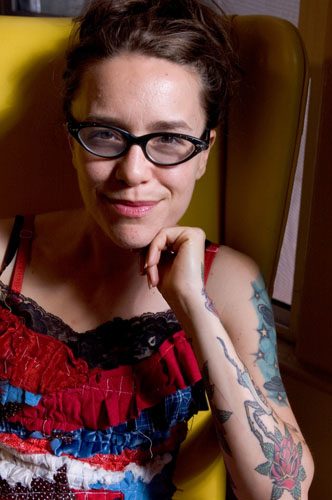Author Michelle Tea chats about the future of Sister Spit.r
I, like other writer dykes of my generation, have a mild Michelle Tea obsession. She’s contributed to dozens of anthologies and has edited a handful, most recently It’s So You: 35 Women Write About Personal Expression Through Fashion and Style, a collection of fashion musings from contributors as diverse as Jenny Shimizu, Kate Bornstein and Sonic Youth’s Kim Gordon.
Naturally, I was pretty psyched to meet Tea in person. Tea was surprisingly chatty, smiley and down-to-earth: all rare qualities for an ultra-hip San Francisco lit legend and queer feminist icon.
What was it like to go back to touring with Sister Spit after so long?
It was really strange and great. It was a wonderful tour. It was so different from the Sister Spit tours in the ’90s. It was so much less debaucherous. It was so much less bottom of the barrel. We were able to do primarily colleges and to actually make money, which meant I could pay the performers. I mean, in the ’90s I had lost money off Sister Spit. [Now] we were staying in hotels and we were giving everyone [a] food per diem, and so it just felt like we were high-rolling. It was crazy. The downside is there’s a certain amount of experiencing the inside of a town when you’re being put up in people’s homes. And so there weren’t as many insane adventures.
Are there any adventures you can share?
Columbia, Mo., was crazy! Columbia, Mo., was off the hook. It was nuts. So after our show there, we went to the gay karaoke bar with a bunch of people from the audience. And it was like Girls Gone Wild. It was like, suddenly girls on the tour were doing tequila shots off each other’s cleavage. And it was fun because everyone was doing karaoke. Eileen Myles did this crazy old-time karaoke. It was really great. It was fun.
What’s your audience like at the shows?
Well, because we were doing mostly colleges, students and mostly girls, and mostly queer girls. But you know, sometimes boys, and certainly straight girls too. We’re going to try [on the next tour] to do more shows off-campus because the only thing about doing on-campus shows is there’s no variety to the folks you’re performing to. I love them all. But it just is nice to hit the city—you get people of different ages, you get people of different class backgrounds.
Do you think your audiences are pretty much the same as the ones that would show up in the ’90s?
Totally. It’s the next generation of the people who came, and then it’s plus the people who also came in the ’90s.
How big is your average audience?
It really varied on this last tour. University of Delaware, we performed to like, six people. I guess at the University of Delaware there’re only six people in that college interested in the six people in Sister Spit. And then, when we did our show here in San Francisco, or in Brooklyn, or in Chicago, we had huge crowds. So it really just depends on who’s living in that town, who has heard that we’re coming—like, how did the word get out, where did the word get out?
You do a lot of community things in San Francisco, don’t you? I mean, there’s Radar …
Yeah! I feel really lucky. I am the artistic director of Radar Productions. It’s a literary nonprofit—I actually got nonprofit status.
And you were the founder, right?
Yeah. I had a mentor, Jeff Jones. He has his own nonprofit, the Queer Cultural Center. I was doing my work, so alienated from the system, any system, for so long, and curating events in San Francisco, probably for 14 years. And Jeff was able to see the work I was doing and say, “You are a nonprofit. You don’t understand that, but the work you’re doing is what a nonprofit does, and you could get the funding that a nonprofit gets.” I had been working for free, without getting any money, putting on these events for free. Any money that I did get in went to the performers, or benefits to fund Sister Spit. I worked for probably 11 years doing queer community literary events without ever making money off it. And a few years ago he was able to work with me to start getting grant funding. So now, I’m able to do the same work and make a living off of it. It’s great to know that people will read for free, or for $20, but it’s awesome to be able to give people $1,000 and say, “Here, write something new and come read.” I never thought I would be in a position where I was paying other people. I was always just hoping that maybe one day I’d get paid. So it’s surpassed my wildest dreams.
